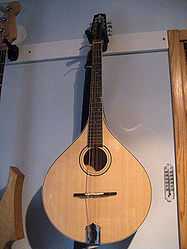Octave mandolin
 | |
| Other names | Mandola, Octave mandola, Tenor mandola |
|---|---|
| Classification | |
| Related instruments | |
| |
The octave mandolin is a fretted string instrument with four pairs of strings tuned in fifths, G, D, A, E (low to high), an octave below a mandolin. It has a 20 to 23-inch scale length and its construction is similar to other instruments in the mandolin family. Usually the courses are all unison pairs but the lower two may sometimes be strung as octave pairs with the higher-pitched octave string on top so that it is hit before the thicker lower-pitched string.
Octave mandolins are sometimes used in mandolin orchestras in place of mandolas.[1] The mandolinists thus avoid learning to read music on the alto clef; music for the octave mandolin is usually written on the more familiar treble clef, and played an octave lower than the notes shown (see octave clefs).
Terminology
The names of the mandolin family instruments vary between Europe and the United States.[2] The instruments that are known in the USA as the mandola and the octave mandolin tend to be known in Great Britain and Ireland as the tenor mandola, the octave mandola, or the Irish bouzouki. Also, octave mandola is sometimes applied to what in the U.S. is a mandocello. In Europe outside the British isles, mandola is the larger GDAE tuned instrument while the smaller CGDA tuned one is known as alt-mandoline (i.e., alto mandolin), mandoliola or liola.
This geographic distinction is not crisp, and there are cases of each term being used in each country. Jimmy Moon, a Scottish luthier calls his version of the instrument by both names and Paul Shippey, an English luthier uses the term octave mandolin. Confusion will likely continue as the terms continue to be used interchangeably.
See also
- Irish bouzouki
- Mandocello
- Mando-bass
- Stringed instrument tunings
References
- ↑ The Franco-American Mandolin Festival, Program notes, 2007
- ↑ "The Mandolin Family", The Acoustic Music Co., UK
External links
- Octave mandolin at Banjolin gives an explanation of why Europeans use the term Octave Mandola.
- John McGann on Octave Mandolin John McGann, author of "Guide to Octave Mandolin and Bouzouki" proposes standardized terminology and discusses a variety of issues on playing the octave mandolin.
- theMandolinTuner, a mandolin site focusing on mandolin tuning, chords and tabs
Further reading
- Richards, Tobe A. (2006). The Octave Mandolin Chord Bible: GDAE Standard Tuning 2,160 Chords. United Kingdom: Cabot Books. ISBN 0-9553944-5-7 ISBN 978-0-9553944-5-4. —
- McGann, John (2004). A Guide to Octave Mandolin and Bouzouki. USA/Worldwide: Mel Bay Publications. —